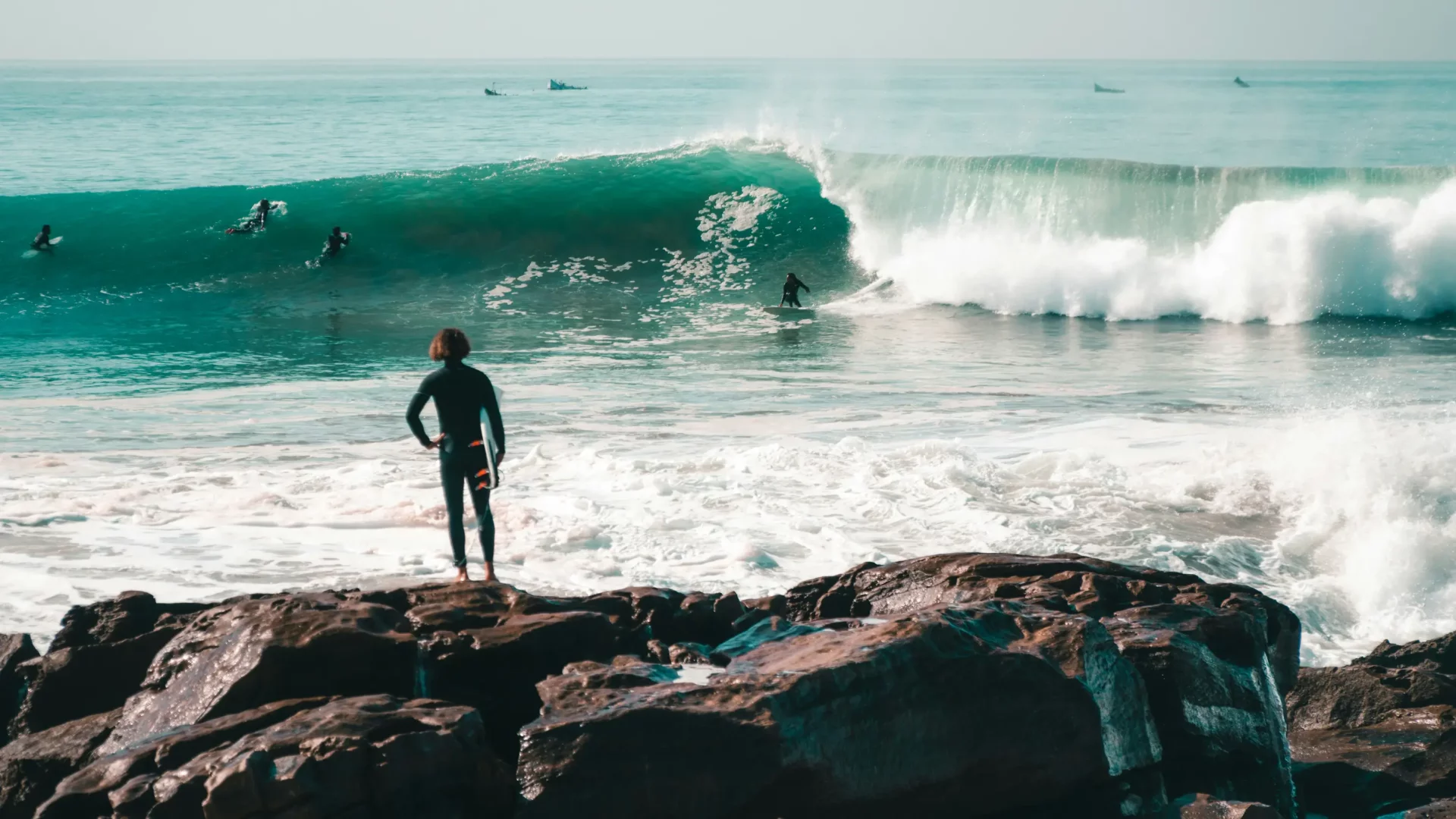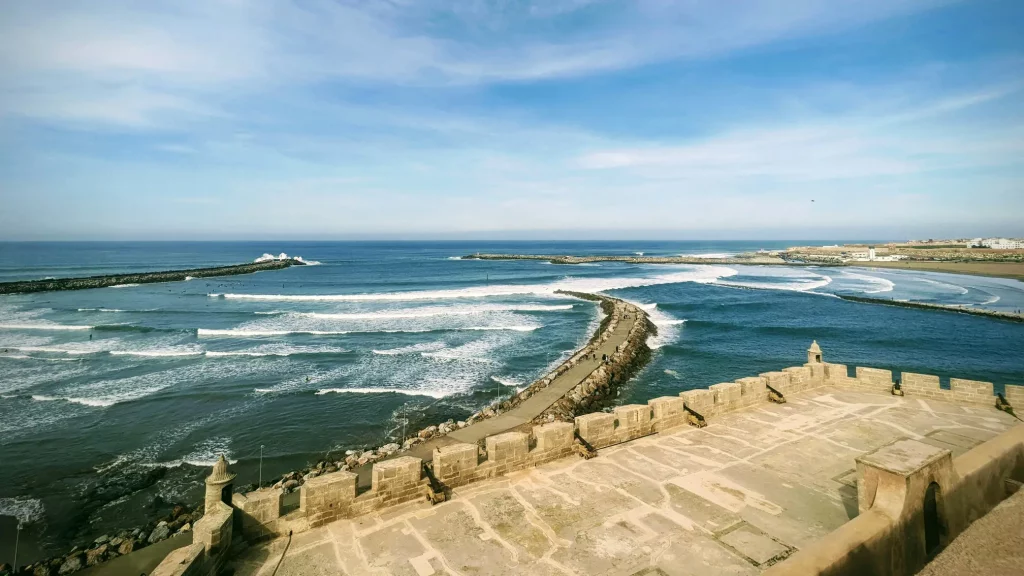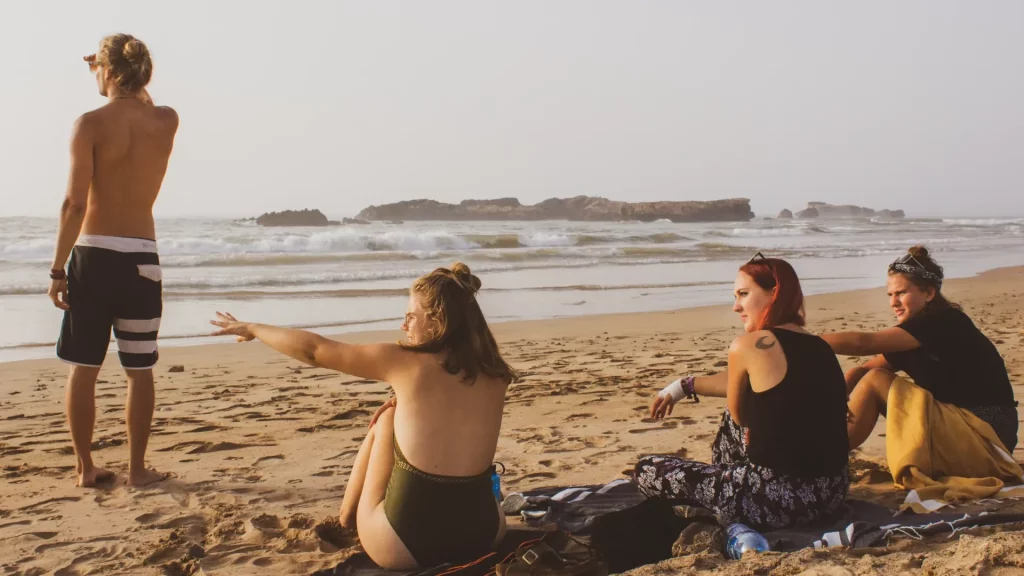Morocco Surf Season Guide 2024

The Morocco surf season definitely is a real thing! Although people argue the Morocco surf season is all year round, there is definitely times where the swell is better and bigger!
Let's get into the Morocco surf season guide answering questions that every surfer heading to Morocco should know!
When is the Morocco Surf Season?
Morocco's surf season typically occurs during the fall and winter months, from September to April.
This period is characterized by larger swells and more consistent waves, making it ideal for surfers.
The Atlantic coast of Morocco, especially areas like Taghazout and Agadir, is popular among surfers during this time.
However, it's important to note that conditions can vary, and local factors such as wind and tide can also influence the quality of the surf learn more using our Morocco surf guide.
Morocco Surf Seasons Highlight
Here is a brief summary of the Morocco surf seasons:
- Spring (March to May): As temperatures rise, spring provides surfers with pleasant conditions along the Atlantic coast, offering a perfect blend of moderate weather and enjoyable waves.
- Summer (June to August): While summer can be hot, coastal areas like Taghazout offer surfers a chance to catch waves in milder temperatures, attracting enthusiasts to the beaches during the peak tourist season.
- Autumn (September to November): Autumn transforms Morocco into a surfer's paradise, particularly along the Atlantic, where the cooler temperatures and consistent swells create ideal conditions for riding waves.
- Winter (December to February): Winter draws surfers seeking a unique experience to Morocco's Atlantic shores, where the cooler temperatures are accompanied by impressive waves, providing an exhilarating surfing adventure against the backdrop of a diverse landscape.

Morocco Surf Seasons
Here is a detailed dive into the 4 Morocco surf seasons that will help you understand which season you would be suited to before booking your flight:
Spring (March to May)
Spring in Morocco marks the beginning of an excellent surf season along the Atlantic coast.
The waves are consistent and well-suited for surfers of different skill levels. Crowds are relatively smaller during this time, creating a more relaxed surfing atmosphere.
Accommodation and travel costs are usually more budget-friendly compared to the peak summer season.
The wind is moderate, contributing to favorable surfing conditions, and the temperatures are mild, making it an enjoyable season for both surfing and exploring the coastal areas.
Summer (June to August)
Summer brings smaller waves along the Moroccan coast, making it an ideal time for beginners to learn to surf.
Popular spots like Taghazout may still offer decent waves. However, this is the peak tourist season, leading to larger crowds.
Accommodation and travel costs may be higher during these months.
The wind conditions can vary, but generally, the coastal areas experience milder temperatures, providing a pleasant environment for beachgoers and surf enthusiasts.
Autumn (September to November)
Autumn transforms Morocco into a surfer's paradise, especially along the Atlantic.
The waves become consistent and well-shaped, attracting surfers seeking ideal conditions. Crowds are moderate compared to the summer peak, providing a great balance for surfers.
Prices for accommodation and travel remain reasonable.
The wind is generally favorable for surfing, and the temperatures are comfortable, creating an inviting atmosphere for those looking to ride the waves.
Winter (December to February)
Winter draws surfers to Morocco's Atlantic shores, offering impressive waves and a unique surfing experience.
While temperatures vary by region, the waves are often larger, providing an exhilarating challenge for experienced surfers.
Crowds are smaller compared to the peak summer season, contributing to a more serene surfing environment especially in January.
Accommodation and travel costs can be lower during the winter months. Wind conditions are generally favorable, creating opportunities for thrilling rides along the Moroccan coast.
Wave Quality & Skill Level
Whether you're a beginner or an experienced surfer, Morocco offers a range of wave quality throughout the year to match your skill level.
The surfing season in Morocco is divided into two main seasons: winter and summer.
During the winter months from November to February, the Atlantic swells bring powerful waves that are perfect for more advanced surfers.
These waves can reach heights of up to 12 feet and provide thrilling barrels and challenging sections.
*Beginner Tip!
For beginners or those looking for mellower conditions, the summer season from May to September is ideal.
The swell decreases during this time, creating smaller waves with gentle breaks that are great for learning and practising new manoeuvres.
If you're just starting out on your surfing journey, consider planning your trip during these months when the water temperature is warmer too.
Morocco Surf Season: Crowd Factor
Planning your ride for optimal surfing conditions is all about understanding the crowd factor and the Morocco surf season definitely impacts this! Morocco's surf spots can get pretty crowded during certain times of the year, so it's important to plan accordingly if you want to catch those perfect waves without too much competition. The peak season for surfing in Morocco is from September to April when the Atlantic Ocean swells bring consistent and powerful waves to its shores. During this time, you can expect a higher crowd factor, especially at popular breaks like Taghazout and Anchor Point.
However, if you prefer less crowded lineups and are willing to sacrifice some wave size, there are still plenty of opportunities outside of the peak season. From May through August, Morocco experiences smaller swells that attract fewer tourists and locals alike. This is an ideal time for beginners or those looking for a more relaxed surfing experience as you'll have more space on the waves to practise your skills or simply enjoy the beauty of riding Moroccan barrels.
Remember that even during off-peak seasons, weekends tend to be busier with local surfers flocking to their favourite breaks after a long workweek. To avoid larger crowds altogether, consider planning your sessions on weekdays when many people are occupied with their daily routines.
Ultimately though, regardless of whether you choose high or low season for your Moroccan surf adventure, always keep an eye on weather forecasts before heading out! Conditions can change quickly along Morocco's coast due to varying wind directions and tides which may influence both wave quality and crowd factors.
Morocco Surf Season: Weather & Climate
The weather and climate in Morocco play a crucial role in the Morocco surf season. With its unique geographical location, the country experiences a diverse range of environmental factors that contribute to fantastic wave conditions throughout the year. The Mediterranean coastline offers consistent waves during the summer months, thanks to prevailing northwesterly winds known as "Levante." These winds create offshore conditions and generate clean swells perfect for beginner surfers looking to catch their first waves.
As autumn approaches, so does the Atlantic swell season, bringing larger waves and more challenging surf spots along the western coast. Experienced surfers can look forward to testing their skills on powerful reef breaks and point breaks found from Taghazout up through Essaouira. Winter brings bigger swells with it, attracting advanced riders seeking thrilling rides on some of Morocco's most renowned breaks such as Anchor Point and Boilers near Agadir.
Spring is a transitional period for the Morocco surf season where you may encounter variable conditions; however, this time of year often presents uncrowded lineups for those willing to explore lesser-known spots off the beaten path.
Morocco Surf Season: Price Variations
Surfing in Morocco is not just about catching the perfect wave; it's also about timing your trip to match your budget. Understanding how different Morocco surf seasons impact prices can be the key to planning a cost-effective surf adventure.
During the summer months, from May to August, prices for accommodations, surf lessons, and equipment rentals are generally more budget-friendly. This is perfect for beginners looking to get started without breaking the bank.
However, come winter, from December to February, the demand for surf experiences increases, leading to slightly higher costs for everything from lodging to surfboard rentals.
So, when planning your Moroccan surf journey, keep an eye on the calendar to make the most of your budget without compromising on the waves.
Morocco Surf Season Table
| Month | Location | Wave Type | Average Wave Height (ft) | Best Time to Surf |
|---|---|---|---|---|
| January | Taghazout | Point Break | 4-6 | Morning |
| February | Imsouane | Reef Break | 6-8 | Afternoon |
| March | Essaouira | Beach Break | 3-5 | Evening |
| April | Safi | Point Break | 5-7 | Morning |
| May | Sidi Ifni | Reef Break | 6-8 | Afternoon |
| June | Agadir | Beach Break | 4-6 | Evening |
| July | Dakhla | Point Break | 5-7 | Morning |
| August | Mirleft | Reef Break | 6-8 | Afternoon |
| September | Tifnit | Beach Break | 4-6 | Evening |
| October | Anchor Point | Point Break | 5-7 | Morning |
| November | Boilers | Reef Break | 6-8 | Afternoon |
| December | Imsouane | Beach Break | 4-6 | Evening |

Summing It Up: What To Do Now
Perfect now you are up to date on which Morocco surf season is right for you it's time to book that flight! Remember to respect the Moroccan culture and mingle with the friendly locals, these are the magical moments!
If your interested in learning more about surfing discover our many guides that will inform you on your surfing journey. Don't forget to follow us on Facebook & Instagram to stay informed on our amazing surf shots and stories shared from surf creators around the world!
Frequently Asked Questions
When is the best time to surf in Morocco?
The best time to surf in Morocco is during the winter months, from November to March. This is when the Atlantic swells are at their peak, creating perfect conditions for catching some epic waves.
Are there any specific surf spots in Morocco that I should check out?
Absolutely! Morocco is a surfer's paradise with a plethora of incredible surf spots to explore. Some of the must-visit spots include Taghazout, which is known for its consistent waves and vibrant surf culture. Anchor Point is another popular spot, famous for its long right-hand point break that can provide epic rides. If you're up for a challenge, check out Boilers, where powerful waves break over a rocky reef.
What is the water temperature like during the Morocco surf season?
During the Morocco surf season, the water temperature can vary depending on the time of year. In general, it ranges from around 16°C (61°F) in winter to about 22°C (72°F) in summer.
What are the ideal conditions for surfing in Morocco?
The ideal conditions for surfing in Morocco include consistent swells, offshore winds, and a variety of breaks suitable for different skill levels. The best time to catch the perfect waves is during the winter months, from November to March, when the Atlantic Ocean delivers powerful swells to the Moroccan coastline.
Can beginners enjoy surfing in Morocco, or is it more suitable for experienced surfers?
Beginners can absolutely enjoy surfing in Morocco! With its diverse coastline and variety of surf breaks, Morocco offers something for surfers of all skill levels. Whether you're just starting out or have some experience under your belt, you'll find plenty of waves to ride and opportunities to improve your skills. So grab your board and get ready for an epic adventure in Moroccan waters!
Are there any local surf schools or instructors available for lessons in Morocco?
Absolutely! Morocco is home to several local surf schools and experienced instructors who are ready to help you catch your first wave or improve your skills. Whether you're a beginner or an advanced surfer, you'll find plenty of options to choose from.


